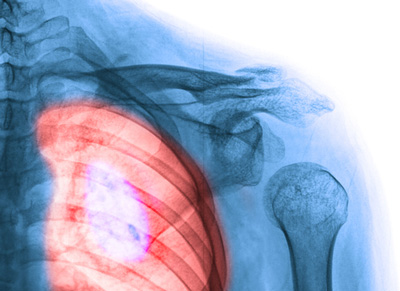MSD has announced results from the Phase 2/3 KEYNOTE-010 study of Keytruda (pembrolizumab) in patients with previously treated non-small cell lung cancer (NSCLC).

KEYNOTE-010 is the first study of its kind to evaluate the potential of an immunotherapy compared to chemotherapy based on prospective measurement of PD-L1 (programmed death receptor-ligand 1) expression in patients with NSCLC. In the study, pembrolizumab significantly improved overall survival (OS) compared to chemotherapy in patients with any level of PD-L1 expression, as defined by a tumour proportion score (TPS) of 1% or more.
“Because lung cancer remains one of the most common and most challenging cancers to treat, understanding the role that pembrolizumab can play in helping patients was essential to our development program. In this study in patients with PD-L1 expression of one% or greater, pembrolizumab demonstrably improved overall survival compared to chemotherapy in previously-treated patients with non-small cell lung cancer, including both squamous and non-squamous histologies,” said Dr Roger M. Perlmutter, president, Merck & Co., Inc.’s / MSD Research Laboratories.
KEYNOTE-010 study included 1,034 patients with advanced NSCLC with PD-L1 expression (TPS of 1% or more). Similar findings were shown in patients who received of pembrolizumab at doses of 2 mg/kg every three weeks and 10 mg/kg every three weeks. Both groups of patients who received pembrolizumab were compared to patients who received docetaxel.
Overall survival was superior for pembrolizumab in patients with higher PD-L1 expression
In the total study population (all levels of PD-L1 expression), both doses of pembrolizumab studied significantly improved overall survival (OS) compared with docetaxel. Specifically, pembrolizumab resulted in a 29% improvement in OS for the 2 mg/kg dose and a 39% improvement in OS for the 10 mg/kg dose, compared to docetaxel. The estimated 1-year OS rates for pembrolizumab were 43.2% and 52.3%, respectively, compared to 34.6% for docetaxel. Median OS for pembrolizumab were 10.4 months and 12.7 months, respectively, compared to 8.5 months for docetaxel.
Among patients with higher levels of PD-L1 expression, OS was superior for both pembrolizumab doses compared with docetaxel. Specifically, pembrolizumab improved OS by 46% for the 2 mg/kg dose and by 50% for the 10 mg/kg dose, compared to docetaxel. Median OS for pembrolizumab (2 mg/kg and 10 mg/kg, respectively) was 14.9 months and 17.3 months, compared to 8.2 months for docetaxel.
In the total study population, pembrolizumab prolonged progression-free survival (PFS) at both doses, though statistical significance was not met.
Patients with higher levels of PD-L1 expression who were treated with pembrolizumab had significantly prolonged PFS compared to docetaxel. Among patients treated with pembrolizumab (2 mg/kg and 10 mg/kg, respectively), median PFS was 5.0 months and 5.2 months, compared to 4.1 months for docetaxel.
Additionally, the safety of pembrolizumab was consistent with what has been seen in previous trials among advanced lung cancer patients.

